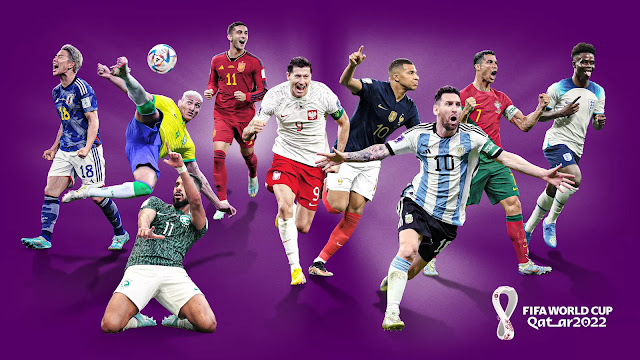FIFA World Cup 2022: A Spectacle of Football Excellence
Introduction
The FIFA World Cup is the pinnacle of international football, captivating billions of fans around the globe. As the most prestigious tournament in the sport, it showcases the finest talents, exhilarating matches, and a celebration of the beautiful game. In this SEO optimized article, we delve into the eagerly anticipated FIFA World Cup 2022, exploring its host nation, stadiums, participating teams, key players, potential outcomes, and the impact of technology on the tournament. Join us as we embark on a comprehensive journey through the exciting world of football and immerse ourselves in the passion and drama of this extraordinary event.
FIFA - Fédération Internationale de Football Association
History
The historical backdrop of FIFA (Fédération Internationale de Football Affiliation) ranges north of 100 years and is interwoven with the turn of events and globalization of football (soccer) as the world's most well known sport. Here is a concise outline of FIFA's set of experiences in 400 words:
FIFA was established on May 21, 1904, in Paris, determined to arrange and advancing global football contests. The drive to make a global administering body for football came from a few European countries, including Belgium, Denmark, France, the Netherlands, Spain, Sweden, and Switzerland. The establishing individuals tried to lay out normal principles and guidelines to oversee the game.
In the early years, FIFA confronted difficulties in earning boundless respect and laying out its position over public football affiliations. In any case, by the 1930s, FIFA had gained huge headway and effectively coordinated the debut FIFA World Cup in 1930 in Uruguay. The competition caught worldwide consideration and denoted the start of another time in global football.
Throughout the long term, FIFA kept on extending its participation and impact, with additional public affiliations joining the association. It assumed a urgent part in normalizing rules, advancing fair play, and coordinating worldwide rivalries, including mainland titles and youth competitions.
In 1974, João Havelange turned into FIFA's leader, introducing another time of development and commercialization. Under his authority, FIFA zeroed in on expanding its worldwide reach and income streams. The World Cup filled in size and prevalence, drawing in huge number of watchers and supporters around the world. Havelange's residency likewise saw FIFA embrace TV broadcasting and sponsorships, transforming the World Cup into a significant worldwide occasion.
In 1998, Sepp Blatter succeeded Havelange as FIFA president and proceeded with the association's direction of development and improvement. In any case, Blatter's residency was damaged by charges of debasement and debate, prompting his abdication in 2015.
FIFA went through huge changes in light of the debasement embarrassment, including the foundation of autonomous oversight bodies and expanded straightforwardness measures. Gianni Infantino took over as FIFA president in 2016, expecting to reestablish trust and remake the association's standing.
Under Infantino's authority, FIFA has proceeded to advance and foster football around the world, zeroing in on drives like ladies' football, grassroots projects, and social obligation projects. FIFA has likewise embraced mechanical progressions, including the execution of Video Aide Ref (VAR) innovation, pointed toward working on the precision of refereeing choices.
The Host Nation: Qatar
The FIFA World Cup 2022 will be hosted by the vibrant nation of Qatar, marking the first time the tournament will take place in the Middle East. Renowned for its iconic skyline and rich cultural heritage, Qatar has invested heavily in state-of-the-art infrastructure and innovative technologies to create an unforgettable experience for players and fans alike. The compact nature of the tournament, with stadiums located in close proximity, allows fans to soak up the atmosphere and witness multiple matches on the same day. Furthermore, Qatar's commitment to sustainability is reflected in its eco-friendly stadiums, which will be dismantled and donated to other countries after the tournament, leaving a lasting legacy.
Magnificent Stadiums
The FIFA World Cup 2022 will be contested in eight awe-inspiring stadiums, each with its own unique design and story. These venues, built to the highest standards, provide an exceptional experience for spectators and players. From the iconic Lusail Iconic Stadium, which will host the opening match and the final, to the dazzling Al Bayt Stadium, designed to resemble a traditional tent used by nomadic tribes, Qatar's stadiums showcase architectural brilliance and cultural significance. The Supreme Committee for Delivery & Legacy has ensured that the stadiums meet FIFA's stringent guidelines and offer world-class facilities, ensuring the comfort and enjoyment of everyone involved.
Star-Studded Teams and Key Players
The FIFA World Cup is a stage where the world's most talented footballers showcase their skills, representing their respective nations. In 2022, fans can expect to witness a clash of titans, with perennial powerhouses such as Brazil, Germany, Argentina, and Spain vying for glory. The defending champions, France, led by their exceptional young squad, will aim to retain their title and cement their status as a footballing force. Additionally, emerging teams like Belgium, England, and Portugal will present formidable challenges, fueled by their star players.
Speaking of star players, Lionel Messi (Argentina) and Cristiano Ronaldo (Portugal) will likely grace the tournament, adding further intrigue to their individual rivalry. Other exceptional talents such as Kylian Mbappé (France), Neymar (Brazil), and Mohamed Salah (Egypt) will electrify the stage, captivating fans with their incredible skills, speed, and goal-scoring prowess. The World Cup has historically provided a platform for lesser-known players to shine, and 2022 promises to unearth new talents who will capture the hearts of football enthusiasts worldwide.
Potential Tournament Outcomes
Speculation and anticipation surround the potential outcomes of the FIFA World Cup 2022. As with any tournament, surprises and upsets are part of the game, making predictions challenging. Traditional powerhouses will face fierce competition from rising nations, resulting in unpredictable matches and nail-biting moments. The tournament format, which consists of group stages, knockout rounds, and a final, ensures an intense battle for the prestigious trophy.
While it is impossible to predict the winner with certainty, the favorites heading into the tournament include France, Brazil, and Germany. France's youthful and talented squad, Brazil's rich footballing history, and Germany's renowned tactical prowess make them formidable contenders. However, the beauty of the World Cup lies in the unpredictability, as underdogs can upset the balance of power.
Technological Innovations
The FIFA World Cup 2022 will witness the integration of cutting-edge technology, enhancing the tournament experience for players, officials, and fans alike. Video Assistant Referee (VAR) technology, introduced in recent years, will continue to play a crucial role in ensuring fair play by providing video evidence to assist referees in making crucial decisions. VAR has been a subject of debate, but its presence aims to minimize human errors and increase the accuracy of match outcomes.
Furthermore, advancements in broadcasting technology will enable fans to enjoy an immersive viewing experience. High-definition broadcasts, multiple camera angles, and interactive features will bring fans closer to the action, making them feel as if they are in the stadium themselves. Virtual reality (VR) and augmented reality (AR) technologies will also enhance the fan experience by allowing them to explore virtual stadiums, access exclusive content, and engage in interactive games.
Moreover, advancements in sports analytics and player tracking technologies will provide in-depth insights into team performance, player statistics, and tactical analysis. Real-time data on player movements, heat maps, and passing patterns will offer a new level of understanding and appreciation for the game. Coaches and analysts will be able to make data-driven decisions and adjustments during matches, adding a strategic dimension to the World Cup.
Conclusion
The FIFA World Cup 2022 promises to be a spectacle of football excellence, captivating fans with its electrifying matches, passionate supporters, and extraordinary talent on display. As Qatar welcomes the world to its shores, the tournament represents a unique opportunity to experience Middle Eastern culture while celebrating the global language of football. With state-of-the-art stadiums, star-studded teams, potential surprises, and technological innovations, the FIFA World Cup 2022 is poised to be a memorable event that will shape the future of the sport. As the world holds its breath in anticipation, football enthusiasts worldwide eagerly await the kickoff. The countdown to this extraordinary tournament has begun, and it is set to leave an indelible mark on the history of the beautiful game.
THANK YOU FOR READING!!
FOLLOW FOR MORE AMAZING CONTENT
MUST READ -







